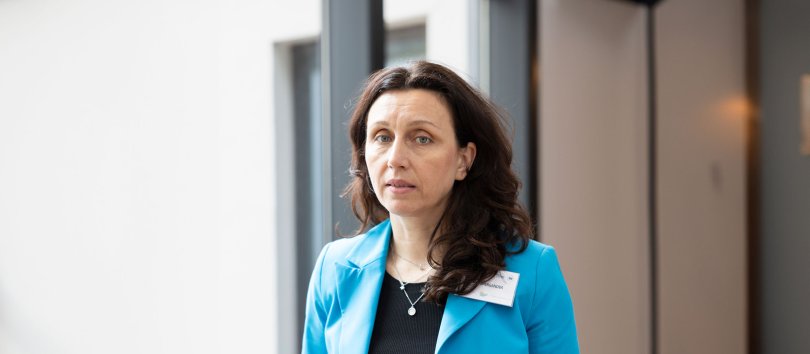
Maximising Moldova’s talents during the European Year of Skills
With the accession to the European Union (EU) on the table and around 100,000 war refugees in the country, Moldova is understandably focused on the skills of its labour force.
Despite financial constraints limiting activities, the European Year of Skills (EYS) has sharpened that focus, says Anna Gherganova, Head of the Ministry of Labour’s Department for Employment, Labour Migration Development and Social Protection, and EYS national coordinator.
“Skills are a hot topic in our country anyway, but the EYS has been a good initiative to raise awareness,” she tells the European Training Foundation (ETF). “We can compare where Moldova is by learning about enterprising work and new initiatives in other countries.”
Pioneering actions in teaching
Moldova has a rich history of developing its own initiatives but has supplemented these by implementing the good practice of innovative projects in EU countries.
“We already have many projects, such as ‘dual education’ linking theory and practice, professional skills standards, internships and traineeships, but we are increasingly involving civil society in skills development, which draws on Ireland’s initiatives. We have also developed skills councils, for example, which build on the Netherland’s experience.”
Moldova’s skills councils – comprising representatives from public and private entities – operate in key sectors such as agriculture, water sanitation and construction, to try and raise the quality of training across the country. They do this by working on occupational standards, assessment tools and curricula, and collaborating with education and employment ministries, for example, to address skills gaps and influence workforce development policies.
“Additionally, in the public employment service we are implementing different initiatives contributing to skills development for job seekers, such as training courses, on-the-job training with labour market involvement, and internships for job seekers,” continues Gherganova. “It has been interesting in EYS meetings to talk with experts from other countries that have good organisation within their public employment service and, for example, where they are developing their barometer of occupations in order to get better results.”
In September 2023, the Moldova’s Ministry of Education launched a new training programme for teachers, in which trainers go to educational institutions rather than vice versa.
“This represents a radically different approach to teacher training, because they train the entire collective,” Gherganova explains. “The Ministry of Education pays the trainers to focus on teachers’ existing problems, such as ensuring the inclusion of children with special educational needs, addressing existing conflicts in the collective, improving the quality of the educational process, and so on.”
Green and digital inclusion
Among the challenges of the ‘twin transition’ is defining what green skills and jobs exactly comprise, because a legal framework and statutory duties first require this shared understanding.
“We already have standards and curricula around the fitting of solar panels and identifying alternative energy sources, for example, but what are the additional specific green skills required?” Gherganova enquires rhetorically.
Regarding the digital transition, Moldova is seeking to improve its physical infrastructure and prioritise digital access to public services through a governmental portal. However, the country faces an uphill struggle because, for example, of the low level of digital skills, especially in rural areas.
“We digitalised job seekers’ registration in the employment service that required an e-signature but found, in 2022, that just six people had registered online, so we now have a specific e-government agency working to simplify the process,” Gherganova explains. “The good news is that with finance from the United Nations Development Programme (UNDP), UN Women and the Lichtenstein Development Service, targeted training courses for young people in rural areas, women, and Girls go IT training – including refugees from Ukraine – are now being provided.”
The EYS national coordinator acknowledges that while Moldova’s public employment service undertakes an annual forecast of labour needs, there is a serious problem with companies’ inability to identify exactly what skills they will need in the future.
“Sixty per cent of job seekers only have up to secondary education, which is a big concern because we have to decide how to provide them with the right skills,” she says.
Facing challenges, doing things better
Russia’s aggression against Ukraine has seriously impacted Moldova because most refugees are women with children, elderly people, and people with disabilities who are not active in the labour market but need support.
“There are only around 1,000 Ukrainians working in Moldova, because many of them are coming and going, and waiting for the war to end so they can go back to their country. That makes it difficult to plan sustainable measures,” Gherganova says.
“However, we believe that at least 20,000 could work here. Most want to work in the service sector providing beauty services or dance classes, and in agriculture and public institutions, such as hospitals and education. Fortunately, international agencies – such as UN Women, the UNDP, the International Organisation for Migration, and the Refugee Agency – and also other entities, such as Norwegian and Swiss non-governmental organisations, offer grants to enable them to attend job-specific training courses or, for example, open their own businesses.”
Many business development agencies also support entrepreneurial skills for migrants, women and young people, explains Gherganova.
“I don’t think we need to change anything, but just do better. Our participation in the EYS has highlighted again, for me personally, for my colleagues and for the ministry, that the competences of the Moldovan labour force are lower than in EU countries, so we have to work on that.”
“If we want to access the EU, we need a more competitive labour force,” she concludes. “We must be better and more competitive through improvement of our education system in general and lifelong learning.”
Did you like this article? If you would like to be notified when new content like this is published, subscribe to receive our email alerts.